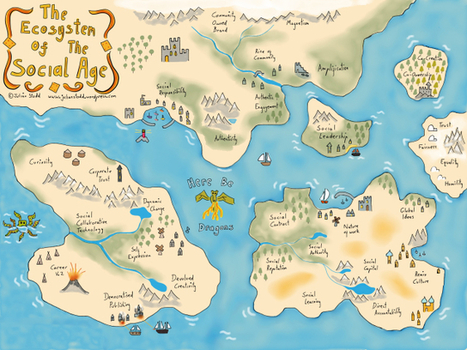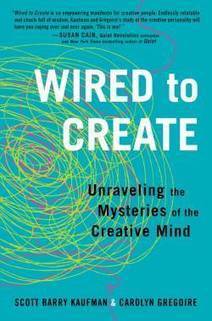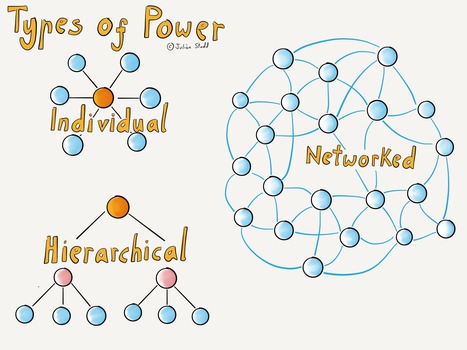 Your new post is loading...
 Your new post is loading...
One of the things that Social Leaders do is to reduce the noise in the system: they filter the signal and reduce the clutter. Today, i'm sharing two of the illustrations that I've been working on for the new book, 'Social Leadership - My 1st 100 Days', covering these two things. This first one relates…
Via Marta Torán
In the Social Age, everything has changed. The Social Contract between organisation and individual is fractured, the nature of work is changing, we’ve seen the democratisation of communication and the devolution of creativity, with the old structures of power and control replaced by socially moderated and dynamic forms of Social Leadership. I’m developing an online…
Via Marta Torán
Organisations are used to accumulating ‘stuff’: from buildings, to filing cabinets, to systems and processes. Everything they accumulate makes them fit for the world of today, but often highly unable to adapt for the world of tomorrow.
The appeal of ‘stuff’ is that you can see it, you can want it, you can buy it, and you can own it. The stuff that we need in the Social Age may be less tangible: communities, trust, Social Leadership, agility, adaptability, creativity.
When you experience rejection, it’s natural to take certain measures in order to preserve your self- esteem, like trying to fit in with a social group and gain their approval. However, research has shown that people who view themselves as independent may be somewhat immune to the negative effects of rejection, and may even use social rejection as creative fuel. Sharon Kim and her colleagues, who conducted the study, hypothesized that these boosts in creativity were fueled by a differentiation mind- set, or as they put it, “salient feelings of being different from others.” Independent people not only may be resistant to the negative consequences of rejection but indeed may be strengthened by experiences that reaffirm their sense of independence. As Kim puts it, “Independent selves are motivated to remain distinctly separate from others.” This motivation may, in turn, trigger psychological processes that boost creative thinking. Rejection is not just a catalyst for creativity—it can also be a by-product of it. As the study’s authors write, “The very traits that distinguish highly creative people, such as unconventionality, make them easy targets for rejection.” Learn more / En savoir plus / Mehr erfahren: http://www.scoop.it/t/21st-century-learning-and-teaching/?tag=Creativity https://gustmees.wordpress.com/?s=creativity http://www.scoop.it/t/21st-century-learning-and-teaching/?tag=Sir+Ken+Robinson
Via Gust MEES, Mark E. Deschaine, PhD
What's the difference between a remote team that performs like a happy, cohesive unit, and one that performs poorly? Tsedal Neeley, associate professor at Harvard Business School and founder of consulting firm Global Matters, has focused on this subject--bridging social and emotional distances on geographically dispersed teams--for more than 15 years. In a recently released article in the Harvard Business Review, Neeley shared a proven framework that has helped leaders manage long-distance employee relationships. The framework, which has five components, is called SPLIT: structure, process, language, identity, and technology. Here's a primer on the framework, along with some insight from Neeley, who recently spoke to Inc. about it.
Via The Learning Factor
Be Ruthless “Quite candidly, I’m really ruthless in terms of doing only those things which are absolutely essential. I’m saying no to a lot, both in work and life. I see a lot of working moms who think they have to be 110% at work, and then volunteer to run the school auction. We’ve become so awful at saying no. I try hard to become incredibly selective about those things I engage with, so I can be really present for the stuff that I’m doing, and be really engaged with my kids in a meaningful way. People are trying to accomplish too much, and they’re killing themselves in the process.”
Via The Learning Factor
Our Connected, Social & Mobile revolution moves sand under our Internet marketing feet twenty years+ after Cluetrain's Manifesto, time for a new manifesto. Had fun writing an update to one of my favorite books - The Cluetrain Manifesto. Here are highlights from the CoSoMo Manifesto:
* We (your customers) are POWERFUL beyond your wildest dream.
* Our (your customers') everyday needs are more than MET.
* Our (your customers') aspirational desires will never be satisfied.
* Greatness is the cost of the poker game you are playing.
* We can't tell You how to be GREAT, but sure know it when we see, feel or buy greatness.
* Our TIME is our most valuable resource, so don't waste it.
* We may know you better ONLINE than you know yourself, so be authentic and real.
* Together we are more powerful than either of us alone.
Via Martin (Marty) Smith, David Hain
|
I've managed to complete 14 new illustrations today, which may be a record... as this is a writing week, where i am focussed on completing the Social Leadership 100 Days book, no new writing, but sharing some images as part of #WorkingOutLoud. This first one accompanies a section on how stories clash with other stories.…
Via Marta Torán
I wrote recently about the types of power that exist within organisations: individual power, based upon our relationships and sphere of direct influence, hierarchical power, which is codified within the formal defined power structure of the organisation, and networked power, reputational authority held and amplified by the community. My original writing in the space was…
Via Marta Torán
I am writing today about power, about different forms of power, and the structures that it is held within. This relates to a number of strands of work that I'm exploring at the moment, from resilience, to Social Leadership, and the limits of hierarchy. In this piece, I'm going to consider three forms of power:…
Via Marta Torán
One of the biggest roadblocks to success is the fear of failure. Fear of failure is worse than failure itself because it condemns you to a life of unrealized potential. A successful response to failure is all in your approach. In a study recently published in the Journal of Experimental Social Psychology, researchers found that success in the face of failure comes from focusing on results (what you hope to achieve), rather than trying not to fail. While it’s tempting to try and avoid failure, people who do this fail far more often than those who optimistically focus on their goals. This sounds rather easy and intuitive, but it’s very hard to do when the consequences of failure are severe. The researchers also found that positive feedback increased people’s chances of success because it fueled the same optimism you experience when focusing solely on your goals.
Via The Learning Factor
When emotional intelligence (EQ) first appeared to the masses, it served as the missing link in a peculiar finding: people with average IQs outperform those with the highest IQs 70 percent of the time. This anomaly threw a massive wrench into the broadly held assumption that IQ was the sole source of success. Decades of research now point to emotional intelligence as being the critical factor that sets star performers apart from the rest of the pack. The connection is so strong that 90 percent of top performers have high emotional intelligence. Emotional intelligence is the "something" in each of us that is a bit intangible. It affects how we manage behavior, navigate social complexities, and make personal decisions to achieve positive results.
Via The Learning Factor
New research suggests that meditation or any other mood-enhancing activity can serve as a nutrient for the human body. “Positive emotion, positive social connections, and physical health influence one another in a self-sustaining, upward-spiral dynamic,” concludes a research team led by psychologist Bethany Kok of the Max Planck Institute for Human Cognitive and Brain Sciences. It found upbeat emotions inspired by a meditative practice led to greater feelings of connectedness with others, which positively impacted “a biological resource that has been linked to numerous health benefits.”
Via Les Howard
|



 Your new post is loading...
Your new post is loading...




























Reducir el ruido...